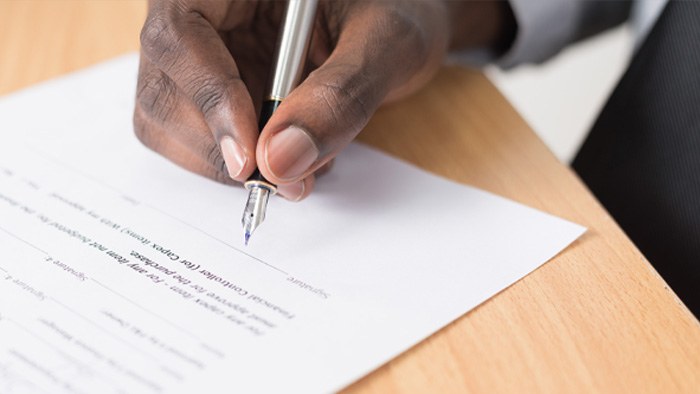We Need to Get a Petition Going to Learn More About ‘Petition’

Who knew, with all of the pressing issues of the moment, that the 229-year-old First Amendment protection of the right to petition would become such a focus in the confirmation hearings for an open U.S. Supreme Court seat?
What’s that saying — “Everything old is new again?”
Our core freedoms might have been plunked down in 1791 as the starter for the Bill of Rights, but those freedoms for most Americans come into play every day.
Far too many of us just take them for granted. That may account for the fact that even for Supreme Court nominee and sitting U.S. Court of Appeals Judge Amy Coney Barrett, “petition” was the freedom she forgot when she was pressed to name the five in public.
Petition is the one nicknamed by First Amendment scholars as the “orphan freedom” for its relative obscurity in the nation’s collective brain.
The 45 words — and five freedoms — came up multiple times in the Senate judicial committee hearings on Barrett’s nomination.
Barrett’s lapse puts her in the company of an average of 96 percent of her fellow citizens (none of them nominated to the court, to be sure) who have been unable to identify petition as one of the five freedoms in Freedom Forum surveys taken since 1997.
It may be worth noting here that failing to name all five freedoms may well mean you flunk the test that hopeful immigrants must pass to become American citizens.
Sen. Ben Sasse (R-Neb.), started the whole thing by asking Barrett to name the First Five.
Sasse gets a few First Amendment bonus points for trying to help Barrett, when she asked, “What am I missing?” by saying the forgotten freedom was “redress and protest.”
In fact, the founders provided that we have the right to “petition for redress of grievances.” And “petition” is a lot more than just protest.
Not quitting when no one was ahead, Sasse then asked the nominee if she could explain why principal author of the First Amendment James Madison bundled those freedoms into one amendment. Her response: “I don’t know what you’re getting at on that one. You mean like what is the common denominator? … I don’t know why, actually.”
Sasse again attempted to help, and again gets mixed points for his response: “You don’t really have freedom of religion if you don’t also have freedom of assembly.”
Well, that “assembly” freedom does apply to faiths that have congregations and a need to “pass the plate” to support themselves. But what about faiths that focus on the individual’s right of conscience — to determine their own values independent of others — with no need to gather in one spot at the same time?
And of course, atheists also benefit from the First Amendment’s protection, in its first 16 words, of the right to freely exercise your beliefs without government interference. It would seem they rarely see a reason to assemble solely for the purpose of not worshiping.
More Sasse: “You really don’t have freedom of speech if you cannot publish your beliefs and advocate for them.” Well, “publish” would implicate the amendment’s provision for a “free press” and “advocate” goes back to “petition” with a touch of “assembly.” But this far into the back-and-forth, hopefully we get the drift.
Finally, Sasse closes out this part of the hearing by repeating his imprecise identification of petition, saying “you really don’t have any of those freedoms if you can’t protest at times and seek to redress grievances in times when the government oversteps and tries to curtail any of those freedoms.”
The nation’s founders likely would applaud that analysis. In fact, many of them would put petition atop the other four freedoms, as having the ability to speak truth to power would protect the others.
Where Sasse’s use of “protest” and even “redress” falls short is clear when considering the range of activities covered by “petition.”
As detailed in a permanent Newseum exhibit in Washington D.C., beginning in 2008, the freedom also covers the work of lobbyists: Some “petitioners often are paid lobbyists representing corporations or special interest groups. They try to shape policy and legislation.”
But others among us also use the power of petition. The exhibit noted that “in 1980, Candace Lightner, enraged that a drunken driver killed her daughter, founded the organization now known as Mothers Against Drunk Driving (MADD). The group’s grassroots activism resulted in the passage of many federal and state anti-drunken driving laws.”
From activists today in the streets for Black Lives Matter to those calling for an end to COVID-19 restrictions on mass gatherings and sports events or orders to wear masks in public places, as a group we’re petitioning the government all over the place — and have been.
In this year marking the 100th anniversary of the ratification of women’s right to vote, we should recall that in 1848, 32-year-old Elizabeth Cady Stanton urged a convention in Seneca Falls, N.Y., to organize and petition for that right — leading to the 19th Amendment in 1920.
Supporters of a popular movement called Prohibition used petition to prod Congress and the nation in 1919 to adopt the 18th Amendment — and opponents used it to gain repeal of the amendment in 1933. Each year across the nation, advocates fan out to ask us to sign actual petitions favoring or opposing this or that — all free from government interference, thanks to the First Amendment.
The historic examples of petition — and the thousands more examples each year when we go to every level of government to directly ask for change — makes it all the more disappointing that in those annual “State of the First Amendment” surveys by the Freedom Forum, in some years only 1 percent of people could identify “petition.”
Should you want to figuratively adopt this orphan freedom — and be prepared to perhaps humble a future U.S. Supreme Court nominee, or just educate friends and family — you can find information about petition and its four brethren here.
Our nonpartisan foundation believes that encouraging the broad understanding and vigorous use of these fundamental freedoms by the people is the best way to preserve and protect the First Amendment for future generations.
We could argue that we have been a nation of petitioners even prior to the First Amendment — and the nation itself.
Colonial leaders sent requests around multiple grievances before issuing the Declaration of Independence telling England and King George III in 1776 that “In every stage of these oppressions we have petitioned for redress in the most humble terms: Our repeated petitions have been answered only by repeated injury. A prince whose character is thus marked by every act which may define a tyrant, is unfit to be the ruler of a free people.”
Now that is speaking truth to power!
Gene Policinski is a senior fellow for the First Amendment at the Freedom Forum. He can be reached at [email protected].
Perspective: 5 U.S. Olympic Athletes Who Flexed Their First Amendment Muscles
1A in Action: Brigitte Bandit and Fighting for the Right to Perform in Drag
Related Content
2025 Al Neuharth Free Spirit and Journalism Conference
All-Expenses-Paid Trip To Washington, D.C.
June 22-27, 2025
Skill-Building
Network Growing
Head Start On Your Future

